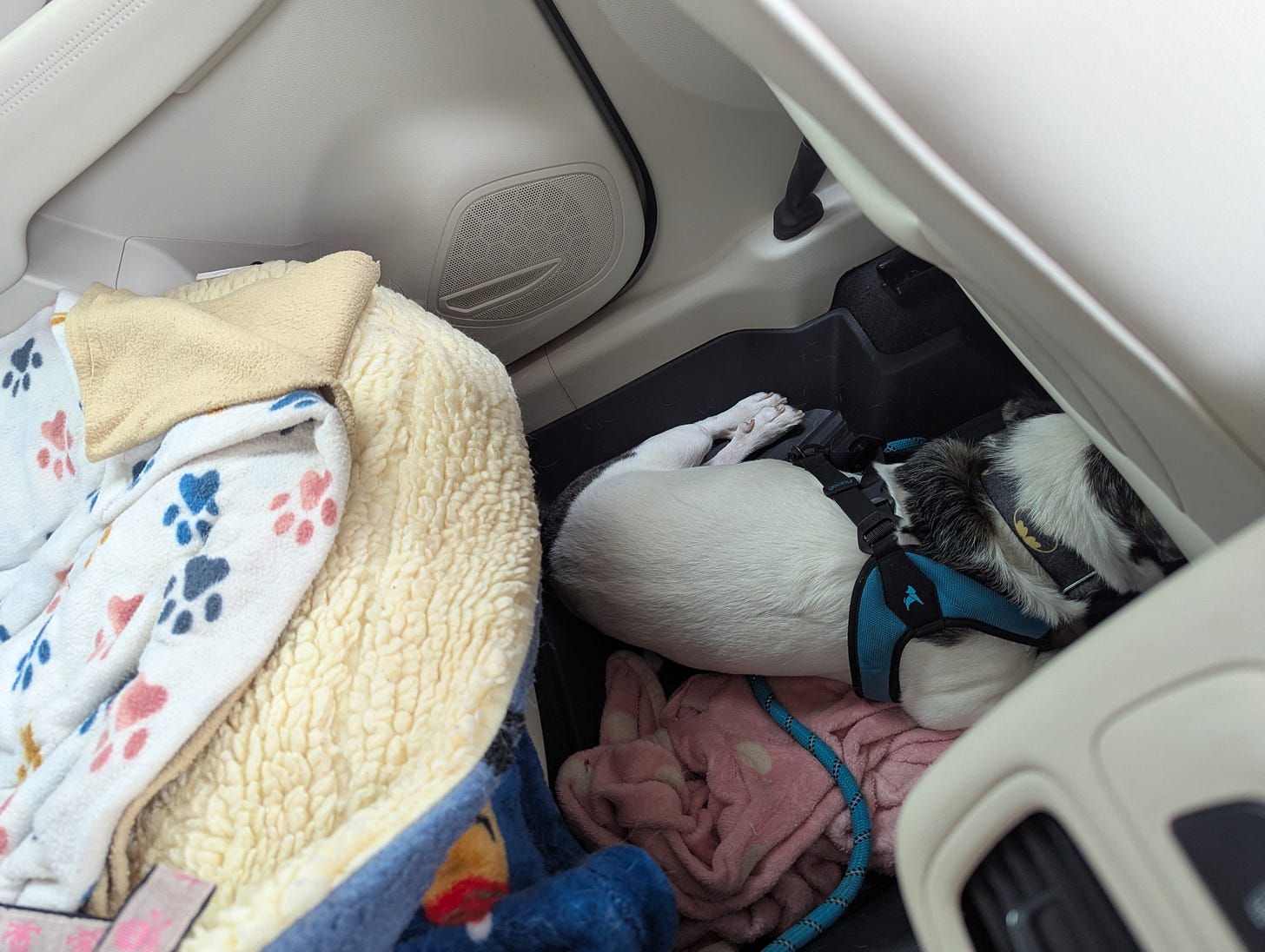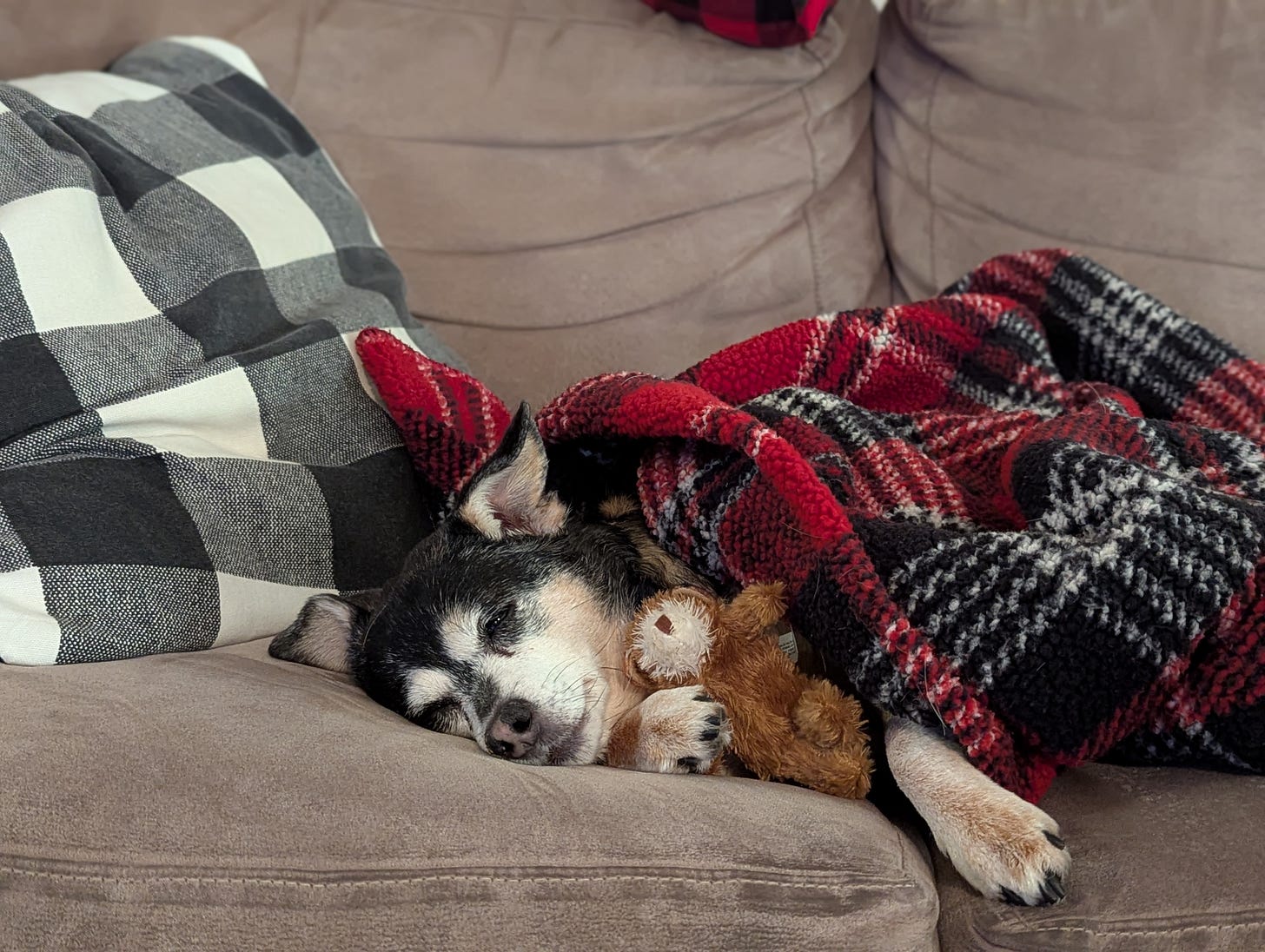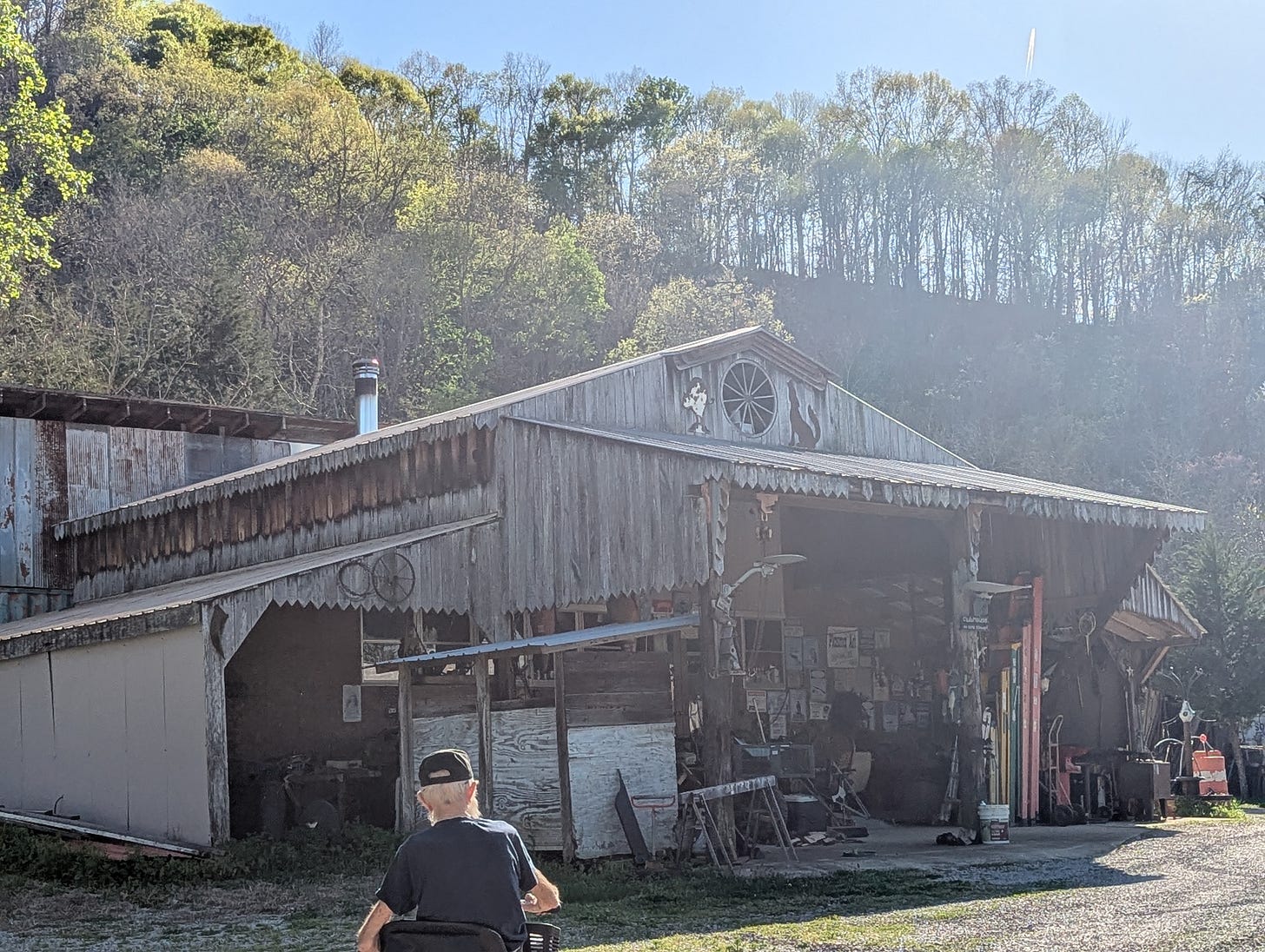During the second week of April, my husband and I loaded the dogs in the car and drove to Tennessee. I rented the little cabin near my father’s house for the entire month because it’s cheaper than renting it by the day or week. This allowed his youngest sister, my aunt, to stay there during the first week and visit him since they hadn’t seen each other in several years.
Making the eight-hour drive with two dogs is always an adventure, and it became a ten-hour endurance test this time. Somewhere in Kentucky, just south of Cincinnati, Bruce got carsick and threw up in the back seat. My husband took the nearest exit and pulled into a gas station where he took the dogs for a walk while I grabbed the roll of paper towels I brilliantly packed and got to work cleaning.
For an hour prior to Bruce’s dramatic upchuck, I thought I smelled dog farts. Dog people know what I’m talking about. I peeked into the back seat a couple times to make sure it wasn’t anything else and all looked good. What a fool I was. Gidget made a tiny little poo then buried in a blanket, so it became invisible to the naked eye. Although I failed to find it with my eyes, I managed to find it with my backside. I sat squarely in it, then wriggled around for good measure.
I cleaned up after Bruce, cleaned up after Gidget, then peeled off my jeans and changed into a pair of leggings inside the cramped confines of the car. I made the command decision to throw away the little fleece blanket Gidget had turned into a poopy hot pocket, and I wanted to throw away my jeans as well.

Both of the dogs have stayed at the cabin on previous visits, so they were perfectly content to nap on that couch. Gidget did more napping, while Bruce enjoyed sniffing every nook and cranny of the mountainside in search of the rodents his terrier DNA insisted he find. My husband kept busy walking Bruce multiple times a day.

When I got to my father’s house, he looked unchanged from last month. If anything, he seemed a little bit stronger and ate better than he had before. The combination of powerful pain medicine and a hospital bed with a comfortable mattress topper allowed him better sleep than he experienced in years. A chairside oxygen concentrator gave him relief from his previous gasping for air. As an asthmatic wheezer myself, I know how exhausting it can be to struggle with breathing. Hospice care has definitely improved his quality of life.
With this renewed vigor, his personality is returning, and I’m learning that I never really knew my father. My parents divorced before my earliest memories, so I have no recollection of him and I living in the same house. Visitation was sparse during my childhood, and I only began to get acquainted with him in my early twenties, after I left my first husband.
During that time, we briefly resided under the same roof when he allowed me to sleep on the couch in his living room rather than continue staying at a women’s shelter, but we didn’t see much of each other. My shift work had me gone from three in the afternoon until two in the morning, picking up as much overtime as I could to finance the hope of an apartment, and his tree business had him gone from seven in the morning until seven at night. Our only shared time in the house occurred when we were both asleep.
I moved into an apartment by Easter, and he moved out of the state by Thanksgiving. I didn’t see him again for quite a while. Twelve years after he moved away, he came back to Michigan for a couple days to visit me in the hospital after my failing heart decided to have a cardiac arrest, but he left after I coded again and went back on the ventilator.
I was furious with him when I came off the ventilator to discover he had gone, leaving only a note. I felt as if he had abandoned me, very much like when I was a child. His absence was once again a bigger part of my life than his presence.
I believe that he tried to make amends fourteen years later, when I had my second heart transplant, by helping to furnish my Nashville apartment with his flea-market finds and serving as my secondary caregiver on paper in order to help me satisfy the hospital’s requirement.
Now he is the one who is ill, and I am the caregiver. Last month, I helped him to dress, to eat, and to perform other activities of daily life. Hours moved slowly even as days sped by. We spent long periods of time just sitting and talking – the most together time we’ve ever spent together. I curled up next to him in his bed and looked through old photos and items he collected on his world travels. He has been to nearly 100 countries over the years. His favorite, he told me, was Tasmania.

On this visit, he seemed more robust. Adequate rest, oxygenation, and nutrition have bolstered his energy. He is still quite sick, but he has become more independent. I no longer needed to help him with basic activities. When he wanted to do something, he hopped on his motorized scooter and sped away to the kitchen or bathroom without assistance.

I will be returning alone after Easter to spend the final week of the month at the cabin. If he continues to maintain his current vigor, I may scale back the frequency and duration of my visits since he doesn’t seem to need much caregiving beyond what is provided by the hospice workers who come several times during the week.
On this return visit, I hope to have more heartfelt conversations and learn about his life when I wasn’t in it. This is my last chance to have an actual relationship with my father and get to know him as a person before he’s gone forever. Instead of drifting in and out of my life as he has in the past, this time it will be the last goodbye.




Although your father wasn’t present in your life while growing up, it’s clear you share several attributes. You are both determined, strong willed, resilient and creative. I’m so glad you have this time together.
Now is the time before it is too late.